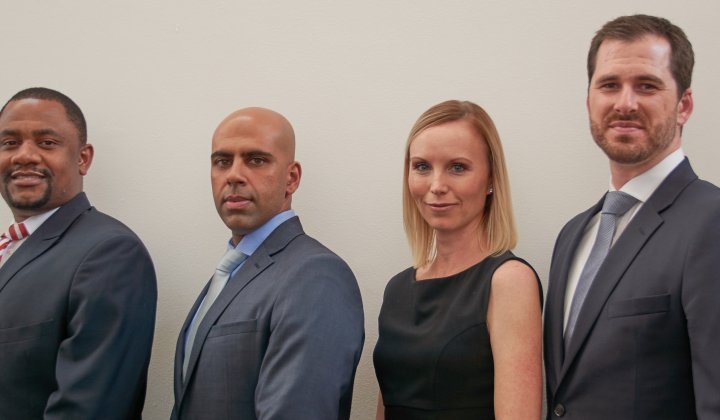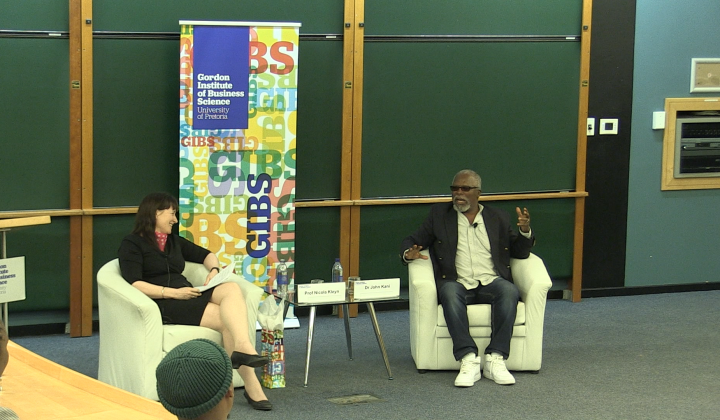The use of case studies makes theories come alive.
Caren Scheepers is a remarkable woman. Not only is she an associate professor and lecturer at GIBS, but she also holds a doctorate in Psychology and is a renowned executive coach. Yet, with all of this on her plate, she has still managed to author and co-author 38 case studies in seven years; case studies that have been published on international platforms such as Harvard Business School, Ivey Business School and Emerald Insight Emerging Markets Case Studies.
It is her work in case studies that garnered Scheepers recent international acclaim when she took home The Case Centre’s 2020 award for Outstanding Contribution to the Case Method. This is not only a fine achievement for Scheepers, who is the fourth woman to take home this award in the past decade, but is also a momentous accolade for GIBS as only the second African institution to win in the 10-year history of the awards.
Based in Europe, The Case Centre is the world’s largest platform for the dissemination of, and training for, global case studies. The not-for-profit organisation is mandated to advance the case method and thereby transform business education around the globe. Since 2011, The Case Centre has held an annual competition – the case method community’s equivalent of the Oscars – recognising people dedicated to writing and teaching case studies worldwide.
The growing appeal of case studies
Case studies have long been recognised as an effective teaching aid for business schools. Scheepers believes this is because case studies serve as a tool to bring business closer to students, thereby making the learning process more real. Their true-story format allows students to discuss and debate real-life issues and determine how they would have resolved the particular challenges raised. “The use of case studies makes theories come alive,” says Scheepers. “It is more than simply teaching models and matrixes; this is a real-life scenario. It is applied learning.”
Traditionally, case studies comprise two parts. The first encompasses the story of the business and the dilemma it faces at a certain point in time. This sets the tone for the discussion by giving the background to the business and setting the scene to explore the context in which the business finds itself. This is the part of the case study that students are given to read in preparation for the classroom discussion. The second part consists of the teaching notes, which are for the lecturer’s eyes only. This details what the company did to resolve the dilemma, their thinking in the lead-up to this decision, and the ultimate outcome. Armed with this additional information, the lecturer uses the teaching notes to steer the class discussion.
While designed to stimulate classroom debate, Scheepers believes case studies go beyond the classroom and are ideal tools for business schools to prepare business leaders for the future. “Our mission at GIBS is to develop responsible leadership. Case studies are a wonderful way of doing that because you have the ability to describe your context and the ethical issues facing the companies.” Scheepers explains that different people have different priorities in times of crisis, and, as these are debated in the classroom, a diversity of views can be shared.
Caren’s case study journey
When she started teaching, Scheepers found that there was a lack of African case studies. She found herself teaching European or North American case studies that had little or no relevance within the African context. Scheepers came to realise that Africans have an obligation to start writing local and regional case studies.
Since 2012, Scheepers has authored and co-authored 38 case studies, but her dedication to the case study method extends to teaching case study writing, using case studies as teaching aids, and then advocating for them to become recognised as academic pieces of work.
“We need to give recognition to case study writing as research output. We do the research, we get ethical clearance, we write the case study, we get the signoff from the client and then we go through the review process,” explains Scheepers. This, she says, is exactly the same process academics go through when they undertake academic journal article writing. It is in this area that Scheepers is deeply grateful to Dean Nicola Kleyn for her advocacy in academic circles.
Newly launched in 2019, the GIBS Case Hub has already published 17 cases...
Big boost for GIBS Case Hub
One of the biggest beneficiaries of this award is the GIBS Case Hub, headed by Professor Albert Wöcke, a renowned case study writer with many awards behind his name. Wöcke gives high praise to Scheepers: “Caren is an absolute asset to the GIBS Case Hub. She is the most prolific case writer at GIBS, and she does fantastic work with collaborating and developing new faculty.” He praised Scheepers for her work in helping newcomers to the case study arena to get published, and have their work distributed internationally.
Newly launched in 2019, the GIBS Case Hub has already published 17 cases and has 19 in various stages of progress. Wöcke explained that for the GIBS Case Hub to achieve the recognition it deserves, it needs to build a substantial collection of African cases. But it is not enough to have a large body of work; it has to be quality work, he adds.
And with the awards for writers mounting, the GIBS Case Hub is doing well. But Wöcke clarifies that the GIBS Case Hub’s measure of success is two-fold. Most importantly, courses need to be taught at GIBS using GIBS case studies, preferably by the writer and ideally with the protagonist present. This is happening. Secondly, schools across the world that are teaching around Africa and emerging markets need to be using GIBS case studies in their courses. This, however, requires increased exposure for the output, its quality and its content.
That is why Scheepers is keen to capitalise on the opportunities being presented to the school as a result of her award. Scheepers laughs when she relates how she sent news of her win to colleagues all over the world in an effort to boost the profile of both GIBS and its Case Hub. As she explains, GIBS’s standing as a business school is directly linked to international recognition of this nature.
A GIBS group effort
Scheepers, however, is adamant that her win is not a singular achievement. She says the success of the business school and its new GIBS Case Hub requires more than the recognition of a single person. As such she was quick to acknowledge Wöcke for his role as head of the GIBS Case Hub. Danie Petzer, GIBS deputy dean, was singularly responsible for her nomination, she says, and Kleyn has been a critically important supporter of GIBS’s case study initiative. Behind the scenes, Scheepers says people like research manager, Zara Cupido, and well as senior information specialist, Monica Sonqishe, and business development specialist, Buhle Simelane, back up the case study writers and the GIBS Case Hub on a daily basis. Without them, this work would be impossible.
Scheepers also pays credit to all the companies who have shared their stories. “I would like to thank our GIBS clients for giving us access to their remarkable stories and for being available to engage with students face-to-face or digitally,” she says.
Building a world-class university that boasts quality case study output through a dedicated Case Hub is a team effort. For Scheepers, this win is an accolade to be shared by everyone with a passion for the case study method.
How to write a world-class case study
· Be passionate about the subject.
· Have a teaching purpose in mind.
· Read and learn what is required from international publishing platforms.
· Always sit down with the protagonist and interview them. It gives a more personal and real account of what is happening in their business.
· If you have no experience, collaborate with an academic who may get value from teaching the case study.
· Collaborate! This allows you to share ideas and often fuels a debate. This adds depth.
· Teach the case study, at least twice, before publishing it.




